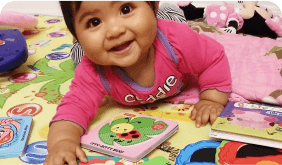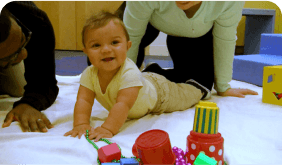-HwvAOH.jpg&w=3840&q=75)
Serves and returns are simple back-and-forth interactions that help Baby build early communication and social skills.
Matches and mismatches happen when you try to respond to Baby’s needs; you’ll get it wrong more than you get it right (which is ok!)!
These everyday moments help Baby feel heard and understood while laying the foundation for lifelong communication.
Before Baby can say “mama” or “milk”, they’re already busy communicating with you. Two ways they do this? Serves and returns, and matches and mismatches.
These everyday interactions help Baby develop expressive language (sending a message) and receptive language (understanding a message), which mold their early social skills. So, let’s talk about how they work!
-WI8exA.png&w=3840&q=75)
What are serves and returns?
It’s like a game of baby tennis, except you “serve” and “return” with communication instead of a ball! Baby “serves” by doing something (like making a sound or looking at you) and you “return” by responding with words, actions, or gestures (like making eye contact with Baby or smiling). Then you wait for Baby to respond back. Back and forth you go!
It’s an amazing exercise that literally builds Baby’s brain: Each repetition helps form and strengthen the brain connections that support language, learning, and social skills.
Plus, responding helps Baby feel seen and heard. (After all, no one likes feeling ignored!) So when Baby serves, be ready to return!
Examples of serves and returns with Baby:
Serve: Baby looks scared.
Return: You comfort them.
Serve: Baby coos at their toys.
Return: You say, “These are your toys!”
Serve: Baby smiles at you.
Return: You smile back or say, “Hi, Baby!”

What are matches and mismatches?
These are all about tuning into Baby’s needs. A “match” is when Baby gives a cue (like crying) and you respond with the thing they want (like a diaper change). A “mismatch” is when you respond, but it’s not quite what they were asking for. Truth is, you’ll get it wrong more than you’ll get it right. And that’s ok!
Mismatches happen a lot because Baby can’t explain what they want yet, and sometimes even they don’t know. The important thing is to keep trying, and keep responding.
Parenting is all about trial and error, so give yourself some grace when making mismatches!
Examples of matches and mismatches with Baby:
Match: Baby sucks on their hand due to hunger, and you feed them.
Mismatch: Baby sucks on their hand due to hunger, but you offer a pacifier instead.
Match: Baby cries because they’re tired, and you put them down for a nap.
Mismatch: Baby cries because they’re tired, but you assume it’s due to teething and give Baby a teether.

Why These Moments Matter
Serves and returns build connection, while matches and mismatches build trust. Together, they help Baby learn what it means to be in a conversation; one where both people listen, respond, and try again.
So when Baby reaches out, in any way, respond. Whether you get it right the first time or not, you’re helping them feel heard and teaching them how communication works!





